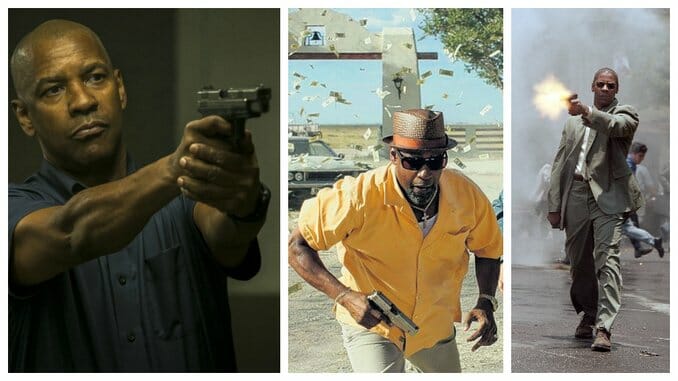All Hail Denzel Washington, King of the Thriller

I sometimes wonder if Denzel Washington knows how often Ethan Hawke mentions him in interviews. Hawke, who never seems to tire of talking shop, hits a new stride in his enthusiasm whenever he’s given the opportunity to wax poetic about his Training Day co-star. “I love somebody [who] sets the bar high, for crying out loud,” he told The Hollywood Reporter in 2015. “I mean, everybody just is so complacent. It’s like they’re waiting for Martin Scorsese to show up to give them permission to do great work. Why not do it now?” With a background in theater and a reputation as an actor’s actor, Washington could have navigated his career by reserving his “great work” for Eugene O’Neill plays and the occasional showy turn in a dramatic film. Thankfully, we live in a timeline where he does all of that and still manages to churn out thrillers and crime movies at a regular clip. And though the 2010s produced some less-than-classic entries into the canon of Denzel thrillers, he’s still taking a “why not do it now” approach to elevate even the most mediocre among them.
For 30-plus years, Washington has routinely pitted his charisma against the commotion of these big, noisy movies, often managing to overwhelm the spectacle around him with the sheer force of his screen presence. While he’s made classics of the genre with other directors (Inside Man hive, rise up), the popular conception of a “Denzel thriller” remains inextricable from Tony Scott, with whom the actor made five movies, starting with the Gene Hackman two-hander Crimson Tide in 1995. Over the course of their next four collaborations, Washington portrayed most of the character types that he still returns to in his thrillers: A killer haunted by his past (Man on Fire), a dogged law-enforcement agent racing against the clock to prevent a disaster (Déjà Vu) and an ordinary Joe who’s good at his job but finds himself in over his head (both Taking of Pelham 123 and Unstoppable). Not all of these are masterpieces, but Scott was a distinctive stylist who knew how to put a hefty budget to use, and Washington’s innate sense of authority helped to counterbalance the director’s choreographed chaos. If there’s an obvious dip in the quality of Denzel thrillers after the 2000s, it’s because the actor never quite found the same dynamic with a director following Scott’s death in 2012.
Even so, Washington remained nearly as prolific of an action-movie presence in the 2010s, extending his reign through the decade as one of the few remaining stars whose name alone can make a dent at the box office, especially when paired with a poster of him carrying a gun. Money aside, the real test of a movie star lies in their ability to pull off ridiculous-sounding character names, so credit to Washington for playing it completely straight as a guy named “Tobin Frost” in 2012’s Safe House. A rogue former CIA agent intent on exposing corruption in the intelligence community, Frost is of the haunted-by-his-past variety of Denzel characters, a Jason Bourne-esque figure with an outsize reputation as a badass. Bland and borderline incoherent, the movie at least offers a whole lot of Washington outsmarting everyone else in the room—one of the most reliably satisfying tropes of his thriller output.
-

-

-

-

-

-

-

-

-

-

-

-

-

-

-

-

-

-

-

-

-

-

-

-

-

-

-

-

-

-

-

-

-

-

-

-

-

-

-

-








































